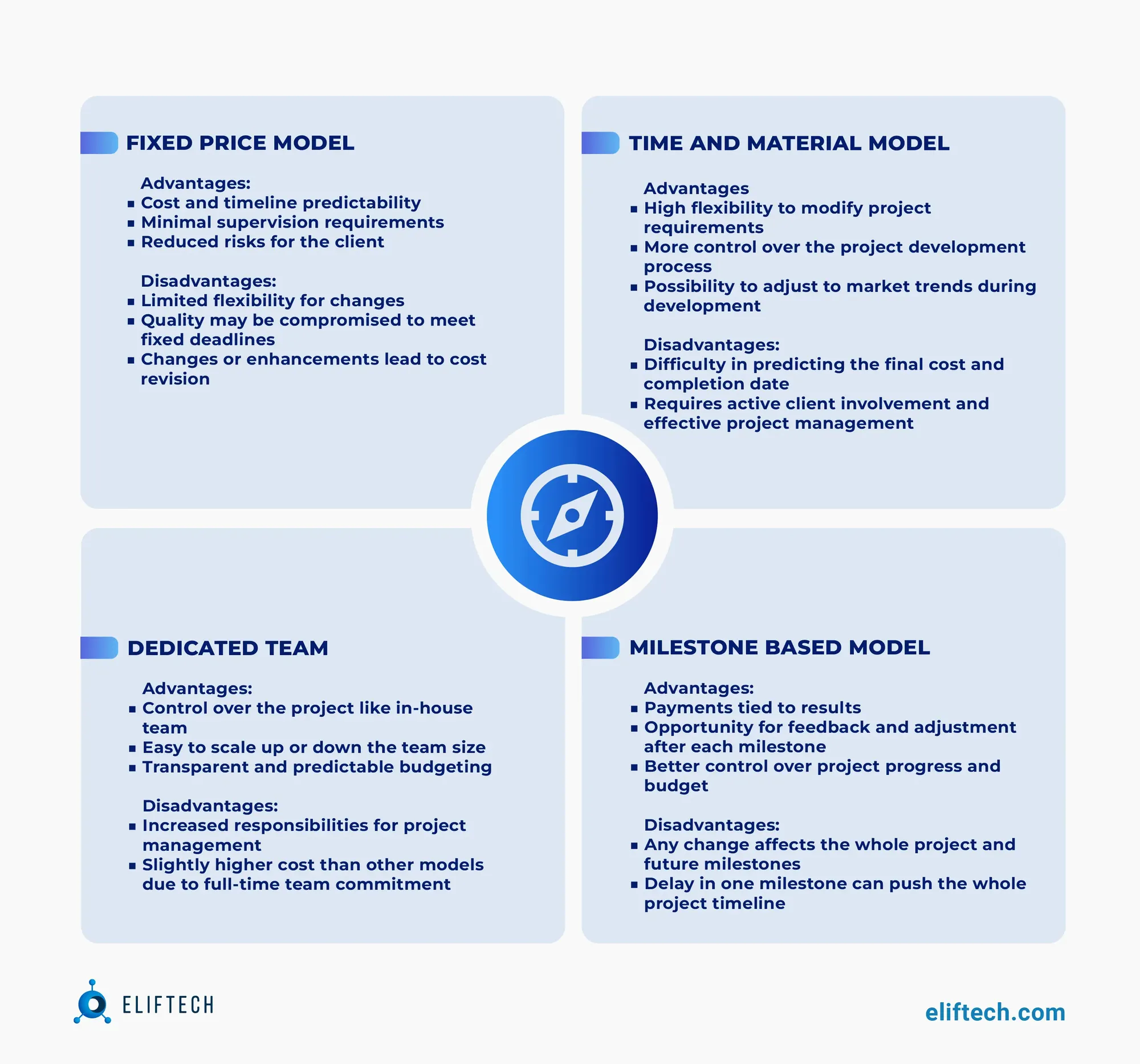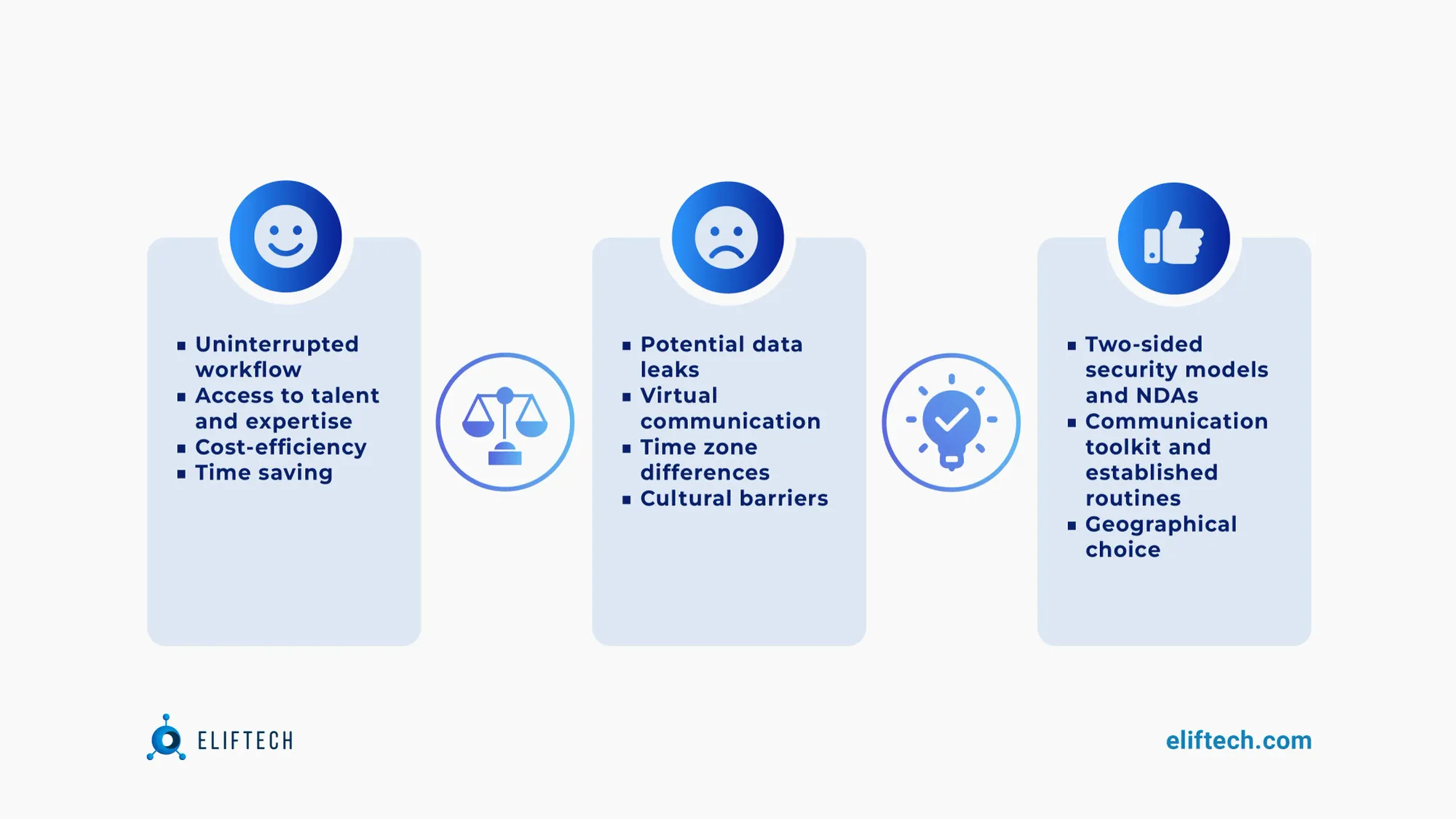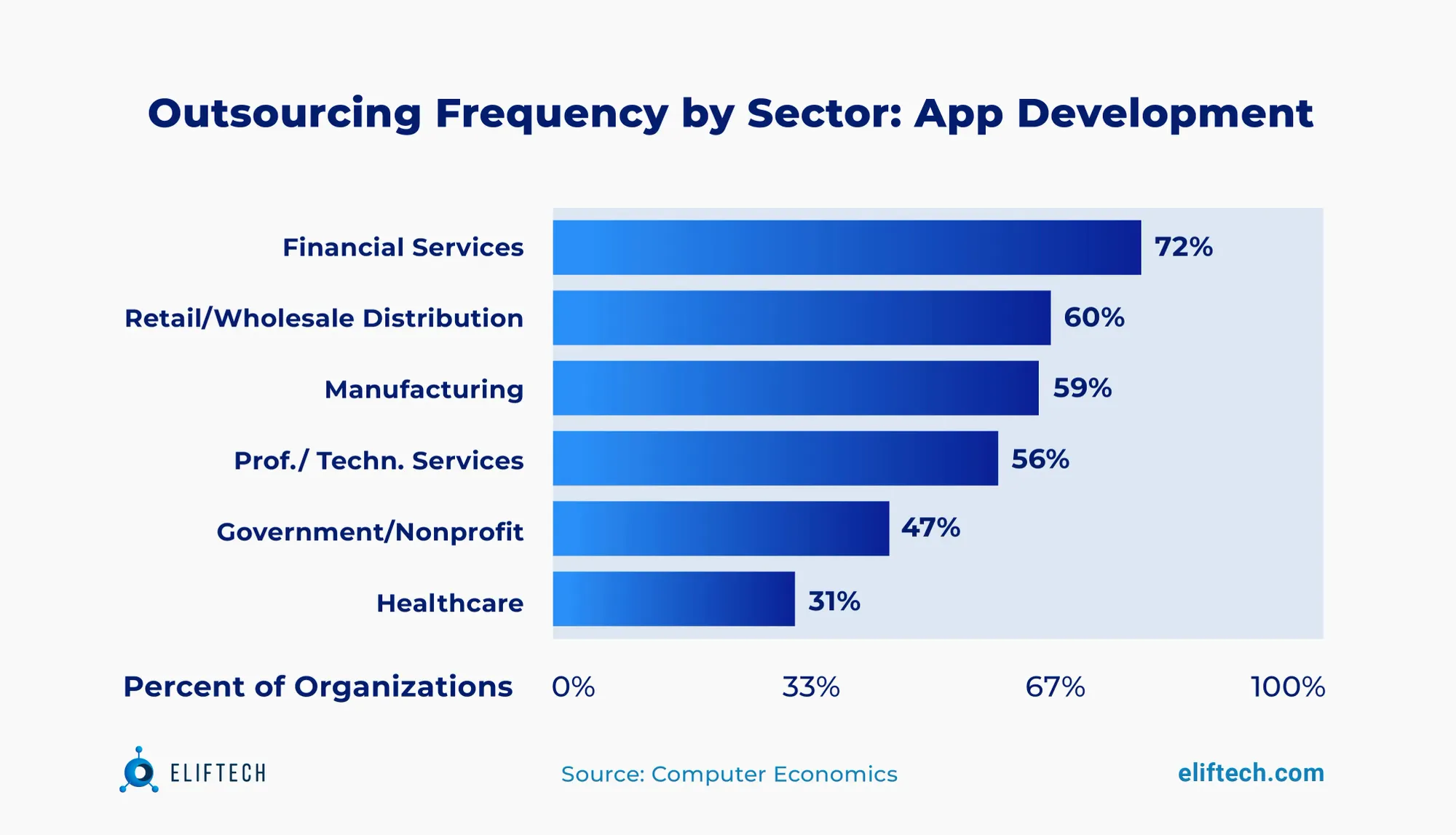Outsourcing
Guide to Enterprise Mobile App Development Outsourcing

As the mobile market continues to flourish, businesses across various industries are increasingly keen on developing mobile applications to broaden their reach and enhance customer experiences. The early months of 2023 have already shown a substantial increase in time spent among the top 10 mobile markets, clocking at 5.5 hours per user. In-app spending, too, shows promising potential, with an estimated value of over $33 billion.
However, the excitement of entering the mobile market is often tempered by challenges such as the scarcity of skilled mobile developers and the hefty costs associated with hiring an in-house team. Fortunately, businesses can turn to enterprise mobile app development outsourcing as a viable alternative.
In-house department versus outsourced mobile app development team
Companies venturing into mobile app development have two primary options to choose from: establishing an in-house department or outsourcing a mobile app development team. Both paths lead to the same outcome but differ significantly in terms of resources involved.
Implementing in-house development is no simple task and requires a significant amount of time, expense, and resource dedication. Here's a look at what's involved:
- Preparing a suitable workspace,
- Procuring necessary equipment and software,
- Hiring dedicated IT specialists and project managers,
- Managing and organizing workflows,
- Training the staff with the latest technologies.
All these verticals need a substantial budget. The time you commit to setting up, managing, and ultimately developing your app in-house can detract from focusing on your core operations.
Enterprise mobile app development outsourcing offers an alternative path that can alleviate these challenges. This approach allows businesses to focus on their primary objectives without worrying about the operational aspects, qualifications, project management, and deadlines. By delegating the technical responsibilities to a third-party developer, companies can:
- Reduce operational strains,
- Gain access to a diverse pool of expert talent without the recruitment hassle,
- Eliminate the need for large upfront investments in resources,
- Reduce time commitment as experienced outsourcing teams often deliver faster results due to their specialist knowledge,
- Preserve focus on core business objectives.
And there are more benefits of outsourced enterprise mobile app development
Outsourcing enterprise mobile app development has gained popularity among businesses looking to build high-quality applications on a budget or with limited in-house expertise. Understanding the benefits of mobile app development outsourcing can help businesses make informed decisions. Here's a more detailed look at these benefits:
- Uninterrupted Workflow: Outsourcing facilitates an improved focus on core business activities. A Deloitte study reveals that 65% of outsourcing vendors and buyers cite the ability to allocate more time to core business functions as their main advantage.
- Access to Talent and Expertise: As talent shortages escalate, hiring skilled IT specialists becomes progressively difficult. Outsourcing grants businesses access to a vast pool of experienced professionals, often at a more competitive price.
- Cost-efficiency: Outsourcing eliminates the need to purchase equipment, rent additional workspace, or hire and train employees, thereby significantly reducing expenses.
- Time-saving: Unlike in-house development, outsourcing eliminates the need for extensive groundwork, enabling vendors to start working on the project immediately.
Mobile app development outsourcing companies or freelancers: What to choose?
When considering mobile app development outsourcing, companies encounter an expansive market teeming with various options, prompting an often-confounding choice: should one hire freelance professionals or engage an app development company? Both options carry different value propositions, and understanding these can significantly impact the success of your enterprise app development project.
Why is there a hunt for freelancers?
Freelancers are independent professionals who specialize in various aspects of enterprise mobile app development process and technology. Hiring freelancers is often a cost-effective option, especially for startups and small-scale projects due to their flexible payment structure, typically hourly rates.
However, they may be more suited for limited-scope tasks rather than fully-fledged app development projects. The ultimate success of your project may hinge on the availability and reliability of the freelancer you hire.
Why mobile app development companies are winning this contest?
Opting for professional enterprise mobile app development companies brings with it a host of advantages that can boost the quality and success rate of your app development project. And while the initial cost of app development companies might be higher than hiring freelancers, the range of professional services, broad expertise, and post-launch support they offer make them a worthy investment for businesses striving to launch successful, future-proof mobile applications. Have a look at what they get:
Comprehensive expertise
Mobile app development outsourcing companies have teams of professionals with expertise spanning multiple domains. For example, the ElifTech team has worked with fintech for over 10 years and thus, speaks both languages — software and finance bringing a unique mix of knowledge to the projects. Teams at outsourcing companies include project managers, UI/UX designers, app developers, quality analysts, and support personnel. Their combined skills are instrumental in creating a well-rounded, high-functioning app.
Streamlined development process
Given their experience dealing with numerous projects, these companies typically follow a streamlined development process. This process involves well-defined stages such as ideation, development, testing, launch, and post-launch support, ensuring that all crucial phases are accounted for and have dedicated resources.
Project scalability
If your project needs to scale up due to growing requirements, a development company can readily adjust to accommodate changes, helping your app adapt to market shifts and user needs. This kind of flexibility is usually hard to achieve with a freelancer.
Legal protection and assurance of quality
Unlike independent freelancers, most mobile app development outsourcing companies are legally bound to deliver certain standards of quality and service. In addition, they have a reputation to uphold, leading them to prioritize client satisfaction.
Post-development support
A key benefit of hiring a mobile app development outsourcing company is the support services they offer after launching your app. These services often include app maintenance, troubleshooting, updates, and refinements, crucial aspects of maintaining a competitive edge in the dynamic app market.
Understanding engagement models in outsourcing
Engagement models form the basis of how companies and mobile app development outsourcing vendors collaborate on projects. They set the guidelines for resource allocation, costs, timelines, and overall project management.
Thus, it’s important to delve into the details of the most commonly used engagement models.

Fixed-price model
In a fixed-price model, the project scope, deadlines, and cost are defined upfront. This model is beneficial for projects with clear and unchanging requirements.
Advantages:
- Cost and timeline predictability
- Minimal supervision requirements
- Reduced risks for the client
Disadvantages:
- Limited flexibility for changes
- Quality may be compromised to meet fixed deadlines
- Changes or enhancements lead to cost revision
Time and material model
The Time and Material model is based on the actual time and resources utilized by the project. The client pays on an hourly basis for the work done. This model is suitable for projects where requirements, scope, and end goals are expected to evolve during the life cycle.
Advantages:
- High flexibility to modify project requirements.
- More control over the project development process
- Possibility to adjust to market trends during development
Disadvantages:
- Difficulty in predicting the final cost and completion date
- Requires active client involvement and effective project management
Dedicated team model
In a dedicated team model, an outsourcing company provides a team of professionals who work exclusively on a client’s project. The client has full control over the team composition and project workflow. This engagement model is ideal when the project’s scope is not clearly defined, or constant changes or long-term projects are anticipated.
Advantages:
- Control over the project like an in-house team
- Easy to scale up or down the team size
- Transparent and predictable budgeting
Disadvantages:
- Increased responsibilities for project management
- Slightly higher cost than other models due to full-time team commitment
Milestone-based model
In a milestone-based model, the project development is divided into several stages or 'milestones'. Payment is made upon completion and acceptance of each milestone. This model is suitable for large-scale projects with measurable phases.
Advantages:
- Payments tied to results
- Opportunity for feedback and adjustment after each milestone
- Better control over project progress and budget
Disadvantages:
- Any change affects the whole project and future milestones
- A delay in one milestone can push the whole project timeline
Mobile app development outsourcing: How much does it cost?
In 2023, mobile app development outsourcing costs greatly vary, largely depending on the complexity of the project, the the functionality required, and the geographical location of your chosen vendor. Below are some estimated app development costs according to multiple sources:
- Simple apps having basic functionality might cost somewhere between $5,000 to $50,000.
- Apps of medium complexity with moderate features and integrations can cost approximately between $20,000 to $200,000
- More complex apps that require advanced functionality and extensive integrations can cost from $50,000 to over $200,000.
Another important factor impacting the development cost is the hourly rate of the development firm. For instance, a fitness mobile app development at an average hourly rate of $40 might start at $63,770. It is worth noting that some complex projects may reach or even exceed $200,000.
Understanding these price ranges can help businesses prepare a reasonable budget when looking to outsource app development. However, it's crucial to remember that while cost is an important factor, it shouldn't compromise the quality and performance of the finished app.
How risks associated with mobile app development outsourcing are typically managed
While outsourcing enterprise mobile app development can be a game-changer for most businesses, some potential challenges come with the territory. Fortunately, outsourcing providers have made significant strides in mitigating these risks over the past decade to remain competitive. Here, we explore specific risks associated with outsourcing and how reliable vendors can effectively manage them.

Potential data leaks
Sharing sensitive company data, including customer data, during the development process might lead to potential data security threats.
How this risk is typically managed: A reliable outsourcing agency will understand the importance of data security and ensure robust security measures are in place. From the get-go, solidify your partnership with Non-Disclosure Agreements (NDAs) to legally protect your data and intellectual property.
Virtual communication
The absence of face-to-face communication may pose challenges in building rapport and ensuring prompt feedback.
How this risk is typically managed: A dependable outsourcing partner will have robust communication practices in place. Utilizing various effective communication channels, and scheduling regular updates, feedback sessions, and catch-ups will help nurture a healthy, transparent working relationship.
Time zone differences
Working with offshore vendors often involves managing time zone differences that may initially seem cumbersome to handle.
How this risk is typically managed: Outsourcing agencies are well-versed in providing services to clients across different time zones. They usually have support teams and developers working in shifts to ensure they provide round-the-clock availability, ensuring seamless communication and timely deliveries.
Cultural barriers
Working with a provider from a different cultural background may present unique challenges in terms of communication styles and business ethics.
How this risk is typically managed: Many outsourcing agencies operate internationally and are accustomed to working with clients from diverse cultures. They train their employees to embrace this diversity, ensuring a comfortable environment that respects different business norms, communication styles, and work ethics.
Is enterprise mobile app development outsourcing worth it?
The frequency of outsourcing enterprise mobile app development across different sectors highlights its broad adoption:
- Financial services lead at 72%,
- Followed by retail at 60%,
- Manufacturing at 59%,
- Professional/Technical services at 56%,
- Government/Non-profit organizations at 47%,
- And healthcare at 41%.
What does this tell us? Firms across these sectors—each carrying their unique needs and challenges—are seeing the value in leveraging external expertise for app development.
So, this brings us to a question worth considering: Is outsourcing mobile app development truly worth it? To answer this, let's explore the pain points associated with app development and how outsourcing mitigates these challenges, offering an attractive and viable solution.

Key pain points in enterprise mobile app development outsourcing
- High Development Costs: Establishing an in-house app development team demands a considerable budget, including hiring skilled professionals, providing a workspace, and procuring equipment.
- Skill Gap and Talent Scarcity: Mobile app development requires a specialized set of skills, and finding highly experienced developers can be challenging and time-consuming.
- Covering Multiple Domains: Mobile app projects span several domains, necessitating comprehensive expertise in UI/UX design, development, testing, project management, and post-launch support.
- Collapsing Profit Margins: While companies invest significant resources in app projects, their profit margins may be weakened due to unforeseen complications or delays, affecting the overall business.
- Lack of Scalability: Adjustments to project requirements, such as growing headcount, are harder to accommodate with in-house teams, impacting the app project's long-term success.
Outsourcing mobile app development - addressing the pain points
Evaluating how outsourcing can alleviate these pain points offers insight into the value it brings to businesses seeking to build robust mobile apps.
- Cost Efficiency: Outsourcing eliminates the need to create an in-house team, cutting expenses while providing access to skilled resources at competitive prices.
- Ease of Access to Talent: Outsourcing companies typically have a vast pool of professionals with diverse expertise in mobile app development, making it easier to find the right team for your project.
- Expertise in Multiple Domains: App development companies furnish teams with a full spectrum of skills, such as UI/UX designers, developers, testers, project managers, and post-launch support personnel who work together to facilitate a seamless and successful app project.
- Optimized Profit Margins: With a lower upfront investment and better control over project expenses, businesses can achieve higher profit margins on their app projects.
- Scalability: Outsourcing vendors are experienced in accommodating changing client requirements, hence they can more readily scale up or down the team size as the project demands, boosting the app project's longevity and sustainability.
Final Say
Given its various advantages, enterprise mobile app development outsourcing is a sound, viable option for businesses seeking to establish a strong presence in the competitive app market. However, it's crucial to carefully assess potential outsourcing partners, ensuring a positive collaboration that leads to a high-quality app that meets your business objectives.
Consider that our team specializes in mobile application development and offers a wide array of services ranging from the design and development of feature-packed apps to delivering exceptional user experiences on mobile platforms.
Our enterprise mobile app development offering includes:
- Comprehensive service: Native iOS & Android apps, cross-platform & hybrid app development, wearables, and app modernization,
- Expertise in emerging technologies: AR, AI, ML, cloud integration, and blockchain,
- Commitment to delivering exceptional user experiences on mobile platforms,
- Seamless compatibility and engaging user experience,
- Catering to various industries: FinTech software development, eCommerce app development, Healthcare software development, IoT development, and more.
But ElifTech isn't just about creating apps; it's about helping enterprises find the perfect solution that resonates with end-users and accelerates growth. Therefore, contact our team and we'll help you assess your project and determine what model of collaboration will work for you.
